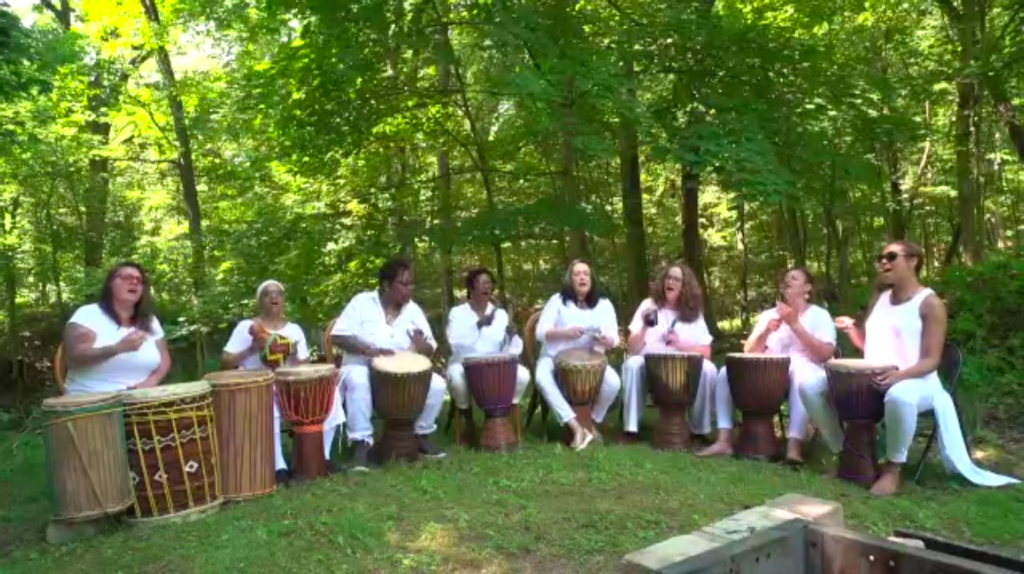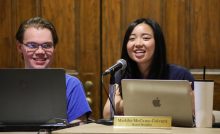“From Swing Low to Strange Fruit” brings African American musical traditions to Juneteenth


“From Swing Low to Strange Fruit” was presented last Friday by Pitt’s Office of Equity, Diversity and Inclusion, featuring local artists and Pitt faculty showcasing the importance of music throughout the African American community as part of a Juneteenth celebration.
Juneteenth marks the day that Major General Gordon Granger announced to slaves in Texas that they were free. Since then, June 19 has been one of the most common dates used to commemorate emancipation, and was recently made a federal holiday. Pitt has joined in the celebration with events such as “From Swing Low to Strange Fruit: The Sounds of Liberation.”
The Office of Equity, Diversity and Inclusion presented “From Swing Low to Strange Fruit” last Friday. It featured many local artists, including Pitt faculty, as a way to showcase the importance of music throughout the African American community as part of a Juneteenth celebration.
James Johnson Jr. and Aaron Johnson, both members of the Jazz Studies department, hosted the event. They showcased recordings of various local groups while demonstrating how music was used in slave communities, such as the use of drums as a way to communicate.
Paula Davis, the associate vice chancellor for diversity, equity and inclusion in the health sciences, helped put together the event and said recognizing Juneteenth is important because of the dual meaning of the occasion.
“It’s important because of what it represents,” Davis said. “When you think that there were an additional two years that people were enslaved before they knew that they were free, and recognized as free. The solemnity of that in addition to the celebration of freedom and of emancipation.”
The event, which is available for viewing on the office’s YouTube page, was put together by the Juneteenth Planning Committee. The office coordinated the committee, with the help of the Pitt Library system, the Alumni Association, Equipoise, Student Affairs and the Office of Health Science Diversity.
Ron Idoko, OEDI’s diversity and multicultural program manager, said the committee wanted Juneteenth to be an opportunity for conversation about emancipation.
”We talked about Juneteenth being an opportunity for everyone to actively come together to talk about liberation,” Idoko said. “How do we continue to uphold the promise of equality? How do we continue to uphold the promise of freedom and the importance of celebrating that?”
Performers featured included the African drumming group ABAFASI, Some of God’s Children Gospel Choir, The Heritage Gospel Chorale of Pittsburgh, James C. Martin, Nicole Mitchell and Coco Elysses, Sam Nelson and Friends and BrothaMans. Pitt faculty also performed, including Kathy Humphrey, the senior vice chancellor for engagement, and Dawn Lundy Martin, director of the Center for African American Poetry and Poetics.
Between each performance the hosts gave a brief historical anecdote to explain how the performance connected to the African American experience, such as how slaves would use drums to communicate across plantations or how R&B music captured the African American experience.
The songs performed ranged from spirituals such as “Sometimes I Feel Like A Motherless Child” to R&B classics such as “People Get Ready” by The Impressions.
Some performances, like the ABAFASI sets that opened and closed the events, were recorded live and outdoors, while others were clips of Zoom performances edited together.
Davis helped record some of the performances and said she appreciated the support from the Pittsburgh community in making it a reality.
“These were all local acts, local performers, that gave their time and their talents and their efforts,” Davis said, “and I think it’s a testament to the relationships that the University has with the community.”
Uchenna Mbawuike, a research specialist at the School of Nursing who attended the event, said she liked how the event combined history and performance.
“They did a really good job of tying the history of Juneteenth to beautiful musical and artistic performance,” Mbawuike said. “It was engaging without you without it being a live performance.”
Mbawuike said she especially liked seeing younger performers celebrate Juneteenth and enjoying themselves as they sang.
“With the youth performances, there’s just all kinds of Black kids you know, mixed and dark-skinned, light-skinned, just celebrating,” Mbawuike said. “It’s been a tough couple of years, so just seeing youth celebrate Juneteenth, and the way they expressed it through their art was really heartwarming.”
This was the second Juneteenth celebration that Pitt put together, and Davis said there are plans to do another one next year.
“I’m sure we’ll do it again next year, whether we’ll be virtual or we’re face-to-face,” Davis said. “Being in person gives us an opportunity to fellowship together, and that’s a wonderful thing. But being virtual, we had over 300 people on today.”
Idoko said highlighting history with events like this is important because it allows us to grow as a society.
“When we think about some of the challenges that we see in society, one thing that we should not shy away from is wanting to understand our history, no matter how challenging some of it may be,” Idoko said. “Because understanding our history serves as the foundation for collective growth.”
Recent Posts
SGB introduces new governing code bill and addresses rumors of ICE on campus
At its weekly meeting at Nordy’s Place on Tuesday, Student Government Board introduced an omnibus…
Opinion | School should be in the summer
Although this may be controversial, I believe that from this data, it is evident that…
Weathering the storm: Pittsburgh teams have tackled some of the toughest environments
The end of the year in western Pennsylvania is always marked by two things —…
Notes From an Average Girl // Notes on Book Banning
In this edition of Notes From an Average Girl, senior staff writer Madeline Milchman writes…
To Be Honest // Yup, it is that damn phone
In this edition of To Be Honest, staff writer Evin Verbrugge writes about her phone…
Meaning at the Movies | Portraying Toxic ‘Adolescence’
In this edition of Meaning at the Movies, staff writer Lauren Deaton explores the mini-series…

